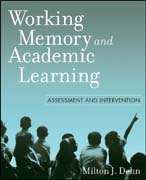
Working Memory and Academic Learning provides school psychologists, special education teachers, and other education professionals with information about working memory's role in learning, as well as guidance on the assessment tools, interventions, and current evidence-based best practices that can be used in school settings. INDICE: Chapter 1. Introduction and Overview. What is Working Memory? Working Memory versus Short-Term Memory. Controversies Surrounding Working Memory.Working Memory Measurement. Compatibility with Response-to-Intervention. Interventions for Working Memory. Learning Objectives. Chapter 2. Theories and Models of Working Memory. Information Processing Model. The Atkinson-Shiffrin Model. Levels of Processing Model. Baddeley's Model. Contributions from Daneman and Carpenter. Kane and Engle's Executive Attention Model. Cowan's Embedded-Process Model. Oberauer's Facet Theory. Long-Term Working Memory. Neuropsychological Evidence. The Controversy Over Working Memory Capacity. Chapter 3. An Integrated Model of Working Memory. The Structure of the Integrated Model. Definition of Working Memory. Descriptions of Memory Components. Capacity of Working Memory Operations. Key Points. Chapter 4. Working Memory Development and Related Cognitive Processes. Development of Working Memory Capacity. Long-Term Memory. Expertise and Automatization. Deficit Models. Relations with Other Cognitive Processes. Disorders and Conditions with Working Memory Deficits. Conclusions and Implications. Chapter 5. Working Memory and Academic Learning. Working Memory and Learning Disabilities. Working Memory and Oral Language. Oral Language Disabilities. Working Memory and Reading. Working Memory and Mathematics. Working Memory and Written Language. Implications for Assessment, Instruction,and Intervention. Chapter 6. Working Memory Assessment Strategies. Working Memory Assessment Challenges. Distinguishing Between Short-Term and Working Memory Measures. Short-Term and Working Memory Testing Paradigms. Hypothesis Driven Assessment of Working Memory. Multimethod Assessment of Working Memory. Reviewing Records for History. Interviews. Observations. Cross-Battery and Selective Testing. Assessment Recommendations for Specific Disabilities. General Guidelines for Interpreting Test Scores. Analysis of Working Memory Test Scores. Interpretation of Working Memory Assessment Results. The Use of Non-Standardized Working Memory Measures. Key Points. Chapter 7. Using Cognitive Scales to Assess Working Memory. Cattell-Horn-Carroll (CHC) Theory and Working Memory. General Guidelines for Selecting Working Memory Subtests. General Guidelines for Administering Working Memory Subtests. Stanford-Binet Intelligence Scales, Fifth Edition (SB5). Differential Ability Scales, Second Edition (DAS-II). Kaufman Assessment Battery for Children, Second Edition (KABC-II). Cognitive Assessment System (CAS). Woodcock-Johnson III Tests of Cognitive Abilities (WJ III COG). Universal Nonverbal Intelligence Test (UNIT). The Wechsler Scales. WISC-IVIntegrated. The NEPSY-II: A Developmental Neuropsychological Assessment. Key Points. Chapter 8. Assessing Working Memory with Memory Scales. Wechsler Memory Scales-Third Edition (WMS-III). Children's Memory Scale (CMS). Test of Memory and Learning-Second Edition (TOMAL-2). Wide Range Assessment of Memory and Learning (WRAML-2). Working Memory Test Battery for Children (WMTB-C). Automated Working Memory Assessment (AWMA). Swanson Cognitive Processing Test (S-CPT).Key Points. Chapter 9. Working Memory Interventions. General Approaches to Working Memory Interventions. General Strategy Training Procedures. Metacognitive Training. Metamemory Training. Working Memory Interventions. Mnemonics. Long-Term Memory Interventions. Phonological Processing Interventions. Reading Comprehension Strategies. Academic Skills and Automaticity. Working Memory Training in Children with ADHD. Medication. Computerized Working Memory Training. Classroom Instruction That Supports Working Memory. Key Points. Chapter 10. CaseStudies, Reporting Results, and Recommendations. Applied Research Study. Assessment Case Studies. Written Interpretation of Working Memory Test Results. Illustrative Psychological Report Summary. Oral Interpretation of Working MemoryTest Results. Recommendations for Future Working Memory Tests. Appendix A. Working Memory Subtests in Cognitive Scales. Appendix B. Working Memory Assessment Plan. Appendix C. Working Memory Analysis Worksheet. Appendix D. Working Memory Interpretative Summary. Appendix E. Working Memory Subtests in Memory Scales. Appendix F. Conversion Table: Scaled Scores to Standard Scores. Appendix G. Related Processing Subtests in Cognitive Scales. References. Index.
- ISBN: 978-0-470-14419-0
- Editorial: John Wiley & Sons
- Encuadernacion: Rústica
- Páginas: 382
- Fecha Publicación: 21/05/2008
- Nº Volúmenes: 1
- Idioma: Inglés
